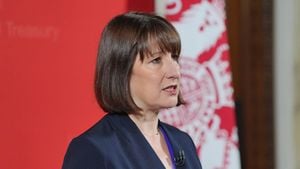Donald Trump has taken another significant step toward reshaping his administration by announcing the appointment of Karoline Leavitt as the White House Press Secretary. The announcement, made on November 16, 2024, signifies not only the return of Trump’s press machine but also marks a pivotal moment as Leavitt will become the youngest person ever to hold this position at just 27 years old.
Leavitt, previously the National Press Secretary for Trump's 2024 campaign, also served as the Assistant Press Secretary during his first term. Trump expressed his confidence in Leavitt’s abilities, remarking, "Karoline is smart, tough, and has proven to be a highly effective communicator." He added, "I have the utmost confidence she will excel at the podium and help deliver our message to the American People as we Make America Great Again."
This appointment is part of Trump's broader strategy of revamping his communications team, which also includes Steven Cheung as his communications director. Cheung has built quite the reputation within Trump’s inner circle for his aggressive communication style and rapid-response tactics. His appointment reflects Trump’s intent to maintain the combative engagement with the media and critics alike.
During her time at Trump’s first White House, Leavitt gained valuable experience, playing a role as presidential speechwriter and later as Assistant Press Secretary. Speaking of her time as she transitioned to working for Trump’s campaign, Leavitt described how her internships at Fox News and the Trump press office spurred her interest in press relations.
Leavitt first garnered national attention during her 2022 congressional race, where she became the youngest female nominee for Congress, running for New Hampshire's 1st District. Although she did not win, the 15,000-vote loss propelled her back onto Trump's radar, landing her a key role as his campaign press secretary. Now, stepping back onto the national stage, Leavitt is prepared to take on the challenges and realities of the press briefing room, known for its high-pressure exchanges and often fierce scrutiny.
The White House press secretary has historically been the public face of the administration. Leavitt, stepping onto this iconic stage, carries the responsibility of managing Trump’s communication strategy, directly addressing media inquiries and defending the administration's policies.
Trump’s relationship with the media has always been tumultuous, characterized by frequent confrontations during press briefings. Previous press secretaries, including Sean Spicer and Sarah Huckabee Sanders, found themselves at the center of heated exchanges, setting the tone for Trump’s aggressive media strategy. With Leavitt’s proven track record as a staunch defender of Trump, her role will inevitably bring about similar dynamics.
Trump disrupted conventional norms of communication during his presidency, preferring to communicate directly with the public via social media and rallies rather than relying solely on press secretaries. This approach has led to speculation about whether Leavitt's role will adhere to traditional press secretary functions or if Trump will continue to dominate the narrative himself. The answer will likely lie somewhere between, as Trump has hinted at maintaining regular access for the press. "If it's not daily, it's going to be a lot. You'll have more than you want," he remarked when discussing his expectations for future briefings.
Leavitt’s previous work included serving as the communications director for Republican Congresswoman Elise Stefanik. Her close working relationship with established Republican figures bolsters her credibility, especially within Trump’s administration, where alignment with party leadership and messaging is pivotal. Her campaign platform echoed many of Trump’s principles, advocating for lower taxes, strong law enforcement, and immigration policies firmly against illegal crossings.
Leavitt’s ascent to press secretary parallels the ever-evolving political narrative following Trump’s recent election victory, intertwining the fortunes of the new administration with the future of the Republican Party. Her role will not only be about addressing the press but also about shaping the conversation around Trump's policies and potential legislation. Expectations are high, and the media spotlight on her will certainly be intense.
Incoming appointments under Trump’s administration reflect a careful curation of allies and advisors who share his vision for governance. Alongside Leavitt and Cheung, Trump has nominated several notable figures, including Doug Collins as Secretary of Veterans Affairs and Robert F. Kennedy Jr. as Secretary of Health and Human Services. The roster sets up potential for renewed conflict over policies amid the backdrop of Trump's America First mandate.
Transitioning back to the White House underlines the significant stakes and scrutiny surrounding Trump's political strategies. The appointment of Leavitt not only points to her accelerated rise within GOP ranks but also to the party's larger conversation on how to maintain relevancy amid political divisiveness. With midterms and national elections on the horizon, Leavitt's strategic insights at the podium will play a pivotal role.
The press room often serves as the arena where negotiations over policy, communication, and public opinion are thrusted onto the forefront. A new era is dawning, and as Leavitt prepares for her public debut, it remains to be seen how effectively she can navigate the challenges set before her. Anticipate fireworks as she assumes her duties; Leavitt's rise encapsulates the energy and expectations tied to Trump's revival.



